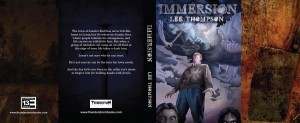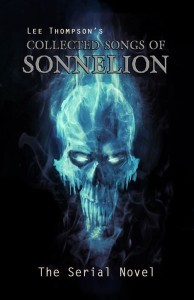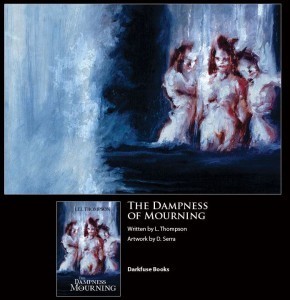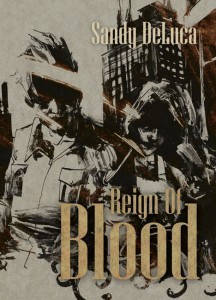Lee Thompson's Blog, page 20
May 25, 2012
Immersion from Thunderstorm Books giveaway!
I should have my author copies of Immersion (a stand-alone novella from Thunderstorm Books) next week. To celebrate that and all of the other awesome things going on I’m going to giveaway 3 paperback copies. But there is a catch! Since I’m a shitty self-promoter I need you to spread the word about my serial novel THE COLLECTED SONGS OF SONNELION (use this link that goes directly to the page on my publisher’s website) either on your blog, on FB, G+, or Twitter. Post where you shared in the comments of this post and in two weeks I’ll draw the three winners! Thanks to everybody who participates!
Chapter 14: The Collected Songs of Sonnelion
Up to chapter 14 already. Time is flying. One more chapter and we’ll be to the halfway point of what will end up being a 90,000 word novel. I’m super proud of it and appreciate all who have followed along so far and those who have stumbled across it late in the game. There are dark times ahead for little Red Piccirilli and a lot of layers that play into the Division Mythos. If you know anyone who enjoys FREE dark fiction please let them know about the serial. A new chapter is going up every Friday, I’m pouring my soul into it, and it’s going to end up being a very special story.
In this Division Mythos novel, which is being serialized on Darkfuse’s website, Red Piccirilli has known madness and magic. They’re in his blood and bound to his soul as much as love and loss are. But when his family moves to the town of Division, Pennsylvania, his father grows distant, his mother troubled, and a murderer roams the countryside.
He searches for meaning and truth while battling his own darkness and rage and despair, but corpses whisper answers the dead only share with one another.
May 21, 2012
Tuesday’s Training: Dialogue
It’s easy to see the difference between good dialogue and bad. Today we’ll look at things to watch out for, plus various techniques to think about and try.
Things to watch out for:
1. A lot of words that say next to nothing.
In the heat of a first draft, especially by a writer who enjoys the sound of their characters talking, it’s easy to overwrite dialogue because it comes so easily. But a lot of times a ton of talking heads doesn’t provide a lot of story, or texture, or sensory details. A lot of times all of that unnecessary dialogue that goes nowhere and contributes nothing to the story is simply a writer attempting to get to know their characters. Nothing wrong with that but there comes a time when you have to cut all the bullshit, la-dee-da, even if it sounds good to you. Study how your favorite writers do it and see how trim and layered their dialogue is. One of the best ways to learn it is to copy it in focused practice. Avoid the motormouth unless he has a purpose, and even then you can save a ton of space and eye rolling by summarizing and only using dialogue in the important sections for that character.
2. Dialogue used too often for info dumps.
Another common problem while learning dialogue (and other elements of writing) is knowing where to put important details. A lot of writers will reveal these things through dialogue, and that can work if it’s creating conflict or engaging the emotions or triggering deeper questions about life, if not… meh. Every sentence of dialogue should be important, even if it isn’t apparent why until later. Think small snippets, think that the only two who are going to be direct with each other are those that respect each other. Everybody else is going to avoid questions, redirect, try to manipulate through the words and tactics they use, etc.
3. Characters not speaking authentically.
A quick turn off for me is reading about a scientist who talks like the drunk guy at the bar. Or a lawyer who talks like they’re a convict. Part of a character speaking authentically rises from their self-image and their social status and who their family and closest friends are. Those things all shape and filter what comes out of a characters mouth, both how and why.
4. Everybody sounds the same.
Another common pitfall for a beginning writer is that all of their characters sound the same. Study the masters, read widely, experiment with various shades of people in your fiction. Part of crafting an engaging story is the textures and contrasts of how each character speaks, what they speak of, and why they’re saying what they say.
5. Everybody sounds too different.
Those beginning writers who are annoyed by books filled with nearly identically speaking characters tend to run toward the other extreme, overdoing it really. Some of your characters will sound similar since they have a bond, they won’t sound like completely different people, nor too similar. It’s all about striking that balance where each character is their own person, but also has the depth of where they’ve come from and how they interact with friends and enemies.
6. Overusing Dialect.
Can easily be done. It makes for difficult reading.
Dynamics
Verbal sparring: Each round of dialogue is a tennis match unless one of the characters is by heart a listener. But even listeners will tire of listening all the time if they’re surrounded by people who never let them talk. Remember that. Listeners have a lot to say and will when they get the chance.
Outright lies: Not every character is going to be honest. Especially when they’re desperate for something, whether its love, or peace, or children, or security, or forgiveness. Remember those little white lies from childhood? Characters use them all the time and they justify it for whatever reason (which you should get to the bottom of since that’s part of their story line.)
Misdirection: Words can lead us astray. Misinformation, whether given intentionally or in ingnorance, can cause all kinds of problems for our characters, which is great. Then they have to make choices, search for the truth, and take action.
Hints/foreshadowing: They’re fun but I don’t know how to explain them all that well since I’ve learned this on more of an instinctual level.
Threats: They happen, whether they’re mild like a parent to their child, or severe (can also be a parent to a child, or any other relationship. Some threats are empty. Some are barbed-wire. They can be blunt or subtle depending on the character.
Passive Aggressiveness: The character that was conditioned to not speak their mind or ask directly for something tend toward passive aggressiveness. They’ll use words to manipulate, guilt trip, shame, confuse, and punish. We all know these type of people in real life. Words are their only weapon.
It’s been a long day and I’m tired. I have more to say about dialogue, just not today.
Remember: There’s a reason behind what each character says because each character wants something.
Midwest Book Review
Just got a thingamagiggie about The Dampness of Mourning. Here’s a snippet. I like the part that says ‘riveting’ a lot. 
Midwest Book Review: “The Dampness of Mourning” is a riveting thriller from Lee Thompson, channeling the bizarre horror of old for the modern day.”
Neat. Thanks to whoever it was that reviewed it!
May 19, 2012
Immersion paperbacks for sale
Been super busy the last few days and trying to catch up on things. If I owe you an email I’ll be getting to it soon.
Glad to see that the paperbacks for IMMERSION are up for sale. Go snag a copy and be part of the revolution!
Thanks. I hope everybody is doing well!
May 18, 2012
Chapter 13 The Collected Songs of Sonnelion
In this Division Mythos novel, which is being serialized on Darkfuse’s website every Friday, Red Piccirilli has known madness and magic. They’re in his blood and bound to his soul as much as love and loss are. But when his family moves to the town of Division, Pennsylvania, his father grows distant, his mother troubled, and a murderer roams the countryside.
He searches for meaning and truth while battling his own darkness and rage and despair, but corpses whisper answers the dead only share with one another.
Thanks to all who have followed along so far and spread the word about the serial novel. I’m very proud of this book. It is essential in the Division Mythos and a explains so well, by the end, why Red Piccirilli is the way is he is as an old man in the later Division books.
May 16, 2012
IMMERSION from Thunderstorm Books (eBook) Release
The town of Jonah’s Reef has never felt like home to Leroy, but it’s where his family lives, where people tolerate his strangeness, and life carries on with little fuss. But when a group of intruders set camp on an old field at the edge of town life takes a dark turn.
Leroy’s not sure who he can trust.
He’s not sure he can be the hero his town needs.
And the boy he’d once been in the cellar isn’t about to forgive him for holding hands with devils.
Super happy to hear from Paul at Thunderstorm Books this morning! My novella IMMERSION just came out in Digital, with paperback and hardcover following in the next couple weeks. Awesome! Thanks to Paul and the artist, Nick Tripiciano. And thanks to everyone who has been supporting my work, whether editors, critters, friends, reviewers, or just old fashioned wonderful readers!
I’ll share some pics of the paperback and hardcover when I get them in too!
Thanks to anybody who spreads the word!
May 14, 2012
Tuesday’s Training: Your muse
Our creativity comes from what has touched, scared and stimulated us before this present moment as well as through thinking on what has never been, what could have been, and what might yet be.
We form narrative from light and shadow, wisps of smoke, whispered prayers, all in hopes that the finished product will connect with and move someone else (hopefully a lot of someones.)
Our muse, our inspirations, come from a number of places and take various processes from quick absorption, a streak of lightning, or the slower, gestating movement that rattles us to our core and takes our breath away. Sometimes the lightning strike produces the gestation, but no matter what inspires us a key aspect of a healthy writing career is to STAY inspired.
I’ve heard tons of people talk about writer’s block. Don’t have a clue how to get through it because I’ve never had it, but I think one of the reasons I haven’t is because of variety, multiple points of inspiration, and a pretty simple approach to life (kinda black and white actually, which isn’t always good but isn’t always bad either because it keeps me focused.)
So, let’s look at the various parts that feed and sustain our muse, our energy, and make our time more effective both before and after creating something new, and hopefully makes what we put ourselves through worthwhile…
Knowledge:
It’s easy to stay inspired when you have knowledge that you’re passionate about, whether it be some aspect of the writing craft, or some aspect of what it means to be human, or the importance of stories, or a deep and abiding knowledge of human emotions. Some of it we pluck consciously from every day life, some floats up like gold-encrusted debris from our subconscious, from lessons learned that can only be learned via hindsight.
But how we come by inspiration isn’t as important as acquiring the seeds that produce more of it.
Inspiration:
That spark of an idea that stirs something in us is always exciting. But we also get inspiration from other places and probably should. Those who wait for inspiration to strike them are happy when it does and tortured when it doesn’t. Who wants to live and create like that? We can make our own inspiration a lot of times by reading books that level us, by reading those that have before, by participating in other creative endeavors (which also bleed over into our writing in a cross-pollination sort of way!), by listening to the wind, watching the stars, letting our minds wander and by remembering what it was like to be a kid without our parents around, when the world held possibilities and not an endless, bone-crushing grind. I find inspiration in all of those things, a little every day, plus in studying beautiful and striking artwork, in playing guitar, in talking to a best friend, in listening to (and sometimes mishearing) a family member. Don’t always wait for inspiration. Breathe life until you’re about to burst so that there is always material creating itself in your subconscious.
Trust:
Trust in our heart-of-hearts that what we write about matters to us and means something is incredibly important. If we don’t trust our process then it’s already standing on shaky ground. It’s easier to be inspired and find inspiration when we know deep in our gut that we’re going to find something worth saying, with characters that bleed and bond together, with dialogue that crackles, with obstacles that push our characters to their limits, and in turn, the reader.
What I’ve done to build trust in my process is to accept that nothing I ever write will be perfect, not to me, not to anybody. It takes some of the pressure off, lets me say, “Hey, I’ll just do my best and that’s all that’s required.” Then I go do my best and more often than not I’m mostly satisfied with the results.
Imagination:
Your muse will probably kick you in the nuts or vagina if you never let your imagination run wild and naked through the forest or bound recklessly down slick city streets. Imagination is paramount. It’s as important as the execution of a tale. It’s details, the way they’re told, the massive scope of the project, and it carries the weight of stars and land and sea. All of the greats had bucket loads of it pressing at the walls of their brains. They dipped their pen in that gushy mass of nerves and created what wasn’t there before.
When I read slush for Horror Library Vol. 4, back before I’d ever sold a story, one of the things that struck me about most of the rejected pieces was a lack of imagination. You know why? Because the majority of them would tell the same stale tale and how do you get excited about that?
We’re all given and nurture (or not) a certain volume of imagination. Those gifted with a lot must be wary that it doesn’t override the story because its easy for the very imaginative to let that fire burn away the story and diminish it. We learn through experience when we have too little or too much. Those who lack imagination are in a similar predicament, but theirs is that their work can come out too bland, bound by the constraints of what their logical, rational minds allow. We have to let go of our place in the world if we’re to let our imaginations grow. I think part of what holds us back is conditioning by parents and preachers and school systems. When we chase security it flees from us because it doesn’t exist. It’s a mirage.
There are many writers but only a handful who have truly inspired me, muses many times in their own way down dark passages and those open, lovely times that are crowded by bliss: William Faulkner, Tom Piccirilli, Stephen King, Ray Bradbury, Mr. Poe, Jack Cady, Greg Gifune, Robert Dunbar, Sara Gruen, Dennis Lehane, John Connolly, Peter Straub, Douglas Clegg, Clive Barker, Cormac McCarthy, John Gardner, Gary Braunbeck, Jack Ketchum, Brian Hodge, Lee Thomas, and Neil Gaiman. I’m going to dedicate my serial novel THE COLLECTED SONGS OF SONNELION to them because they are all in this, hidden between pages and crowding sentences with their undeniable mark.
So, go find those seeds that you can toss to the wind. Be patient while you work and every now and then as you toil away in your closed little world, eyes straining and heart aching, you’ll peek over your shoulder and see those seeds have taken root. What will grow? God only knows. But that’s part of the fun.
May 11, 2012
Chapter 12 The Collected Songs of Sonnelion
In this Division Mythos novel, which is being serialized on Darkfuse’s website every Friday, Red Piccirilli has known madness and magic. They’re in his blood and bound to his soul as much as love and loss are. But when his family moves to the town of Division, Pennsylvania, his father grows distant, his mother troubled, and a murderer roams the countryside.
He searches for meaning and truth while battling his own darkness and rage and despair, but corpses whisper answers the dead only share with one another.
Thanks to all who have followed along so far and spread the word about the serial novel! I appreciate it!
May 8, 2012
Sandy DeLuca Live Event on Darkfuse
Not too long ago I had a blast doing a live event on Darkfuse’s website. And up next they have a very talented lady (writer, artist, photographer) Sandy DeLuca. I’m reading her novel DESCENT now and totally digging it, so I’ll be at the live event to ask her some questions. There will also be some great prizes!
And here’s a fun interview you can check out… Bam!
Come join Sandy at the event Thursday at 9 pm Eastern time.
Thanks!



 .
.





